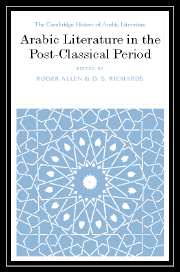19 - Criticism in the post-classical period: a survey
from Part VI - Criticism
Published online by Cambridge University Press: 28 March 2008
Summary
introduction
Criticism is concerned with the evaluation of literary works, often as an academic discipline, and so is somewhat different from the other topics in this volume. Poetry, prose, drama and the various genres the editors have placed under these headings are ‘traditions’ rather than disciplines. This is to say that poets and risāla writers consider other works in their tradition, but do not specifically cite, support and rebut the positions taken in those works. The authors of works on criticism, on the other hand, play by different rules, paying close attention to their predecessors and the conventions of their discipline. They are not producing literature, but very consciously writing about it.
In the post-classical period the disciplines that deal with criticism are largely a continuation of the subjects and methods established in the previous five centuries. Accordingly, this literature includes a lot of rehashing and reorganizing of older material. It would not, however, be fair to say on this account that authors in the post-classical period made no contribution to Arabic literary criticism. As modern scholars must surely admit, one can contribute a great deal by explaining old issues in new ways, and, indeed, three of the most important works of Arabic criticism appear at the outset of this period.
Around 1200, Muhammad al-Sakkākī’s (d. 1229) Miftāh al-‘ulūm (The Key of the Sciences) appears in Central Asia. In the Miftā h al-Sakkākī distils the considerable Arabic tradition on balāgha (eloquence) and builds a general system of semantics which he calls ‘ilm al-balāgha (literally, ‘the science of eloquence’). Al-Sakkākī’s system became the basis for studying Arabic style and is still used today.
- Type
- Chapter
- Information
- Arabic Literature in the Post-Classical Period , pp. 385 - 418Publisher: Cambridge University PressPrint publication year: 2006
References
- 1
- Cited by

